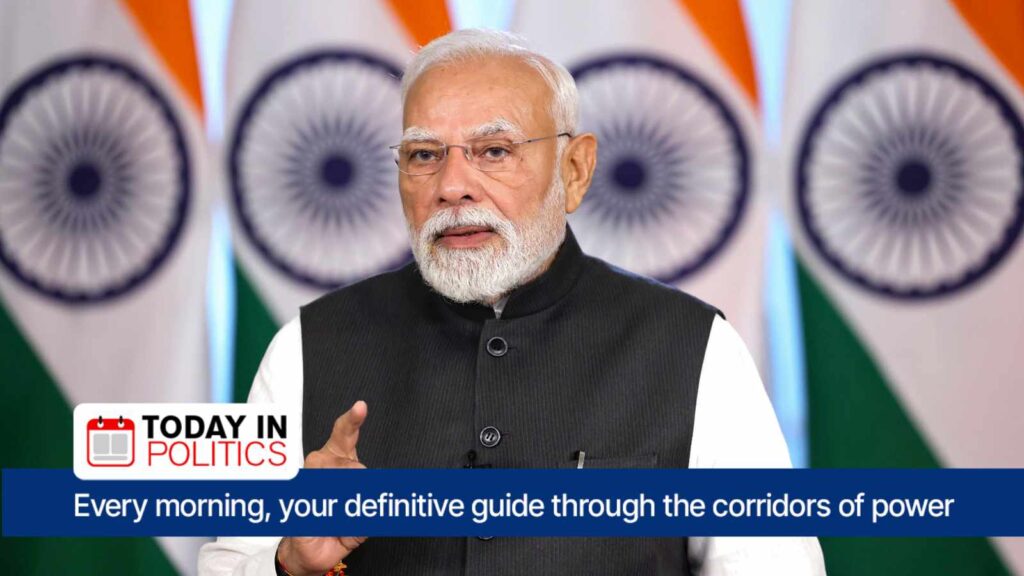970x125
Prime Minister Narendra Modi will deliver his 12th consecutive Independence Day address to the nation on Friday from the Red Fort premises.
970x125
In the centrepiece annual event, the PM is expected to lay out his government’s agenda, present its report card, make important policy and programme announcements and speak on major national issues.
Last year, in the first Independence Day speech of his third term, PM Modi addressed core ideological issues, underlining the need to move towards a “secular civil code” instead of the existent “communal civil code”. Despite the BJP being 32 short of a majority in the Lok Sabha and depending on allies to reach the halfway mark, Modi also made a fresh call for simultaneous elections to the Lok Sabha and state Assemblies.
While Modi spent most of the time of his speech reeling out statistics about the work done by his government in multiple sectors over the last decade, calling for faster reforms and promising to work harder in his third term, the few ideological and political points he made stood out.
Reframing the BJP’s demand for a common civil code to do away with the Muslim personal law as a call for a “secular civil code”, Modi said India has had a “communal civil code” for long.
“The Supreme Court has repeatedly discussed a Uniform Civil Code (UCC) in India. It is true that the civil code that we have is a communal civil code. It is based on discrimination. It is our duty to fulfil the vision of our constitution makers,” said the PM.
The framing was a well-thought-out answer to the Opposition’s accusation over decades that the BJP wants UCC because it wants to replace the Muslim personal law on issues such as marriage and inheritance that affect the Muslim community. Recalling that the Constitution placed the vision for UCC in the Directive Principles of State Policy and that the state should strive towards it — Article 44 talks about the need for it — Modi painted the opponents of the idea as the backers of a “communal” civil code, using the language of the Opposition to hit out at it.
Story continues below this ad
In a clear hint that he would not change his politics because the BJP had fallen short of a majority on its own, Modi had called for simultaneous elections at the Lok Sabha and the state Assemblies. He pointed out that the Ram Nath Kovind Committee, which had been set up to study the idea’s feasibility, had given a good recommendation for the same.
This time, the PM faces two challenges. One, a tense trade standoff between India and the US after President Donald Trump imposed tariffs of up to 50 per cent on India even as bilateral negotiations continue for a deal. Two, the Opposition’s growing protests against the Special Intensive Roll (SIR) exercise in Bihar.
All eyes will be on the PM’s response to these two key discussions.
PM Murmu’s address
In her first detailed public remarks on Operation Sindoor, President Droupadi Murmu Thursday hailed the country’s “steely resolve” in responding to the Pahalgam terrorist attack and pointed to how the world has taken note of India’s stance on fighting terror.
Story continues below this ad
Addressing the nation on the eve of the 79th Independence Day, President Murmu said, “I believe Operation Sindoor will go down in history as an example in humanity’s fight against terrorism.”
In her 22-minute address, the President also dwelt at length on India’s resilience amid stress in the global economy, and the contribution of farmers and workers towards the country’s GDP growth. “In the economic field, our achievements are all the more noticeable… With a GDP growth rate of 6.5 percent in the last fiscal, India is the fastest growing among the major economies in the world,” Murmu said.
“Even amid stress in the global economy, demand at home is pacing ahead. Inflation has remained under control. Exports are rising. All key indicators show the economy in the pink of health. This is as much due to carefully calibrated reforms and sagacious economic management as due to the hard work and dedication of our workers and farmers,” the President said.
On Operation Sindoor and the Pahalgam attack, the President said, “This year we had to face the scourge of terrorism. Killing innocent citizens on holiday in Kashmir was cowardly and utterly inhuman. India responded in a decisive manner and with steely resolve. Operation Sindoor showed that our armed forces are prepared to meet any eventuality when it comes to guarding the nation… With strategic clarity and technical capability, they destroyed terrorist hubs across the border.”
970x125

